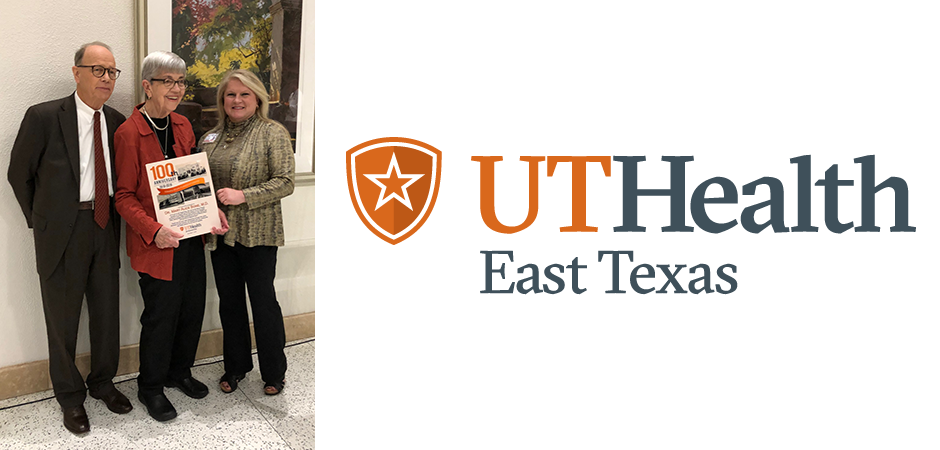
Jacksonville, Texas (November 7, 2019) - From before it even began, one could argue that the life of Dr. Mary Alice Bone, in many ways, was shaped by the Jacksonville hospital.
It’s where her parents met and fell in love. Her father was a physician, a young widower whose wife died during the flu epidemic of 1918. Her mother was a nurse who had been recruited from out of state to work for the hospital, then known as the Cherokee Sanitarium, after her own husband and infant also succumbed to the 1918 flu.
Bone’s parents’ home was a block away from the hospital, and when Bone was born on Aug. 30, 1930, they called for her father to deliver her, as he had all of his other five children.
“I was the only one born in the hospital, I assume because (my mother) was working that day,” Bone said. “The nurses were hanging out the window (watching for him) to make sure he made it on time.”
Bone, 89, was honored Thursday at UT Health Jacksonville as the oldest living person born at the hospital, which is celebrating its 100th anniversary this year.
As a child, Bone’s natural curiosity about medicine was nurtured by her parents.
“I was always bandaging myself up, whether it was real or imagined,” she said. Her efforts extended to neighborhood animals, including the canine recipient of a splint for its injured leg. “When I took the splints on it off and it ran away, I was heartbroken.”
Her love of medicine continued, and she credits her mother with inspiring her to attend medical school in the early 1950s, something very few women did at that time. Bone recalls sitting by her mother’s bed shortly before her mother died of cancer when Bone was 13. Her mother asked what she wanted to do with her life and Bone replied, “I want to be a nurse like you.”
“She said, ‘Don’t be a nurse, be a doctor if you have an interest in the medical profession. When you’re a nurse, you know just enough to want to know a lot more,’” Bone recalled. “I said ‘Women can’t be doctors!’ She said ‘Oh yes they can.’ I had never seen a woman doctor at that time.”
After her mother passed away, Bone went on medical calls with her father and worked in his office some summers, for which she was paid a dime a day.
She attended Southwestern Medical School in Dallas, where she was the first female to be awarded the prestigious Ho Din Award, which is given to the graduate who exemplifies “the unique personal qualities embodied in all great physicians – knowledge, understanding, and, most of all, compassion.”
Bone took a hiatus from medicine after she and her husband, John Robert “Bob” Adamson, started a family, but resumed practicing medicine after her husband graduated from law school and they moved back to Jacksonville in 1959.
“Bob and I both thought at the time we were first married there’s no way either one of us can make a living coming back to our hometown,” Bone recalled with a laugh. “I just feel like I’ve been really blessed because to grow up here in Jacksonville, to come back here and live my life here, marry a guy I dated in high school, raise my children here, it’s just been marvelous.”
When Bone moved back to Jacksonville, she quickly was moved into gynecology, since there were no female OB-GYNs in the area in the mid-1960s. Her medical practice was affiliated with the hospital, which at that point was named Nan Travis Memorial Hospital.
“I feel a real affinity for Nan Travis because both parents worked there I was born there and I was affiliated with Travis Clinic, so all my patients were admitted to Nan Travis Hospital,” Bone said. “The personal touch is something I associate with the Travis Clinic and with the hospital.”
DeLeigh Haley, CEO of UT Health Jacksonville, said that that personal touch is something she’s proud continues today.
“We are so blessed to have been serving this community for a century and we look forward to continuing to provide quality care close to home for the residents of Jacksonville and Cherokee County,” Haley said. “We are truly honored to recognize Dr. Bone not only for her affiliation with the hospital, but for her contributions to the community.”
Bone is still active in the community, providing volunteer gynecology services at Mission House Clinic of Bullard. She also works with the East Texas Human Needs Network and is on the mission advisory board at Helping Others Pursue Enrichment and on the advisory board of YOU!EMPOWER.
Bone might have been the first in her family to be born in the hospital, but two generations followed. Her second son and her first grandchild also were born at the hospital.
“The most beautiful thing about being in the community for 100 years is that this hospital has seen whole generations of families come through our hallways. That’s a responsibility we don’t take lightly,” Haley said.
About UT Health East Texas
UT Health East Texas provides care to thousands of patients each year through an extensive regional network that includes 10 hospitals, more than 50 clinics, the Olympic Plaza Tower, 13 regional rehabilitation facilities, two freestanding emergency centers, regional home health services covering 41 counties, an EMS fleet of more than 50 ambulances and four helicopters, and a comprehensive seven-trauma center care network, including the region’s only Level 1 trauma facility.
As a partner with The University of Texas System, UT Health East Texas is uniquely positioned to provide patients with access to leading-edge research and clinical therapies while training and educating the next generation of physicians and other health professionals. The nationally recognized UT System also includes UT MD Anderson Cancer Center in Houston, UT Southwestern Medical Center in Dallas, as well as three other major university medical centers located throughout the state.
